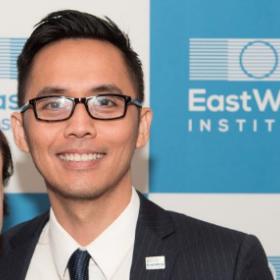
Nuclear Summits, Nuclear Deals, Nuclear Reactors
America's highest priority in getting nuclear agreements is nonproliferation around the world, says Thomas Countryman, U.S. Assistant Secretary for Bureau of International Security and Nonproliferation, in a lively discussion at the EastWest Institute's New York headquarters on April 28.
Joined by EWI CEO and President Cameron Munter, Countryman spoke to an audience as part of EWI's ongoing Smart Talk series and discussed nuclear security amid heightened tensions in some restive parts of the globe.
Nonproliferation has been a top priority for many U.S. presidents since the dawn of the nuclear age under Eisenhower, he said.
Countryman said the U.S. has been more transparent than any other nuclear state about the number and details of its nuclear weapons. In Obama's administration, we are actively dismantling nuclear weapons at the rate of one per day, he explained.
The American diplomat also delved into the controversial nuclear agreement reached last year between the powerful P5+1 nations (U.S., Russia, China, France, UK, Germany) and Iran.
A crucial element in that historical event, said Countryman, was that the U.S. had allies who all believed in the goal of preventing Iran from getting nuclear weapons. He lamented the fact that there had been a poorly informed debate within the U.S. about the deal, but was confident about its future because he said it had blocked every possible path for Iran to building nuclear weapons.
Countryman was quick to add, however, that the Iran agreement could not be easily emulated when dealing with another nuclear-ambitious nation, North Korea. The isolated nation is reportedly preparing for a fifth nuclear test following the last one in January.
First of all, North Korea doesn't have the same level of economic interaction with the world as Iran, said Countryman. He underscored that any kind of international sanctions would be useless if China -Pyongyang's strongest ally and enabler- did not implement them.
The discussion also touched on the future of the Nuclear Summits pioneered by U.S. President Barack Obama, who hosted the fourth and possibly final gathering recently in Washington D.C.
The future of these summits depends on the next U.S. president with whom the important decision lies with, said Countryman.
He also said the next American administration had to ensure the ratification of Comprehensive Nuclear-Test-Ban Treaty (CTBT). The key to preventing nuclear weapons is to make it illegal to test, but many key countries including the U.S, China, India and Pakistan have not signed or ratified it, said Countryman.
The CTBT is a multilateral treaty by which states agree to ban all nuclear explosions in all environments, for military or civilian purposes. It was adopted by the United Nations General Assembly in 1996 but has not entered into force as eight specific states have not ratified the treaty yet.

